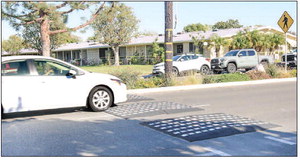LWer’s vigilance deters attempted phone scam
HOW TO AVOID SCAMS
by Emma DiMaggio
emmad@lwsb.com
Last week, Mutual 7 resident Barbara Mogan received a suspicious phone call that could’ve resulted in the loss of $49K. Luckily, Mogan identified the scam before it could escalate.
The call had several tell-tale signs of a scam. First, she received a text from an unknown number claiming that someone had attempted to transfer $49K from her money market account. It provided a number to call for more information, so she called the number.
This was her first mistake: seniors should be suspicious texts or phone calls from numbers they don’t recognize. Scammers will often impersonate someone else, such as a financial institution, a tech support line, a postal company, charity, IRS worker, Medicare professional, insurance broker, pharmacist or family member.
“In retrospect, I should’ve known it was a scam long before I did,” Mogan said.
The man who answered the phone had an Indian accent and claimed to be a representative from her bank, “a big fat lie,” Mogan said.
He repeatedly transferred her call, putting her on the line with a “supervi SCAM
sor,” and then another, to make the call seem legitimate.
They continuously asked her if she lived alone and if she had another phone line, she said.
In retrospect, Mogan realized the scammers were trying to prevent her from calling a friend or relative to help her verify the call.
They told her to go to the bank and withdraw $49K. They even told her what to say to the teller to reduce suspicion: that she was having work done on her house and wanted to pay the workers in cash. They told her to remain on the line while she withdrew the money.
This is another tactic scammers use. By keeping their victim on the phone, it prevents the person from looking into the call further. A quick Google search, or a call to a trusted family member or neighbor, would reveal their ruse.
As she was getting ready to head to the bank, she realized the call was a scam. She hung up the phone and went to her neighbors’ house. Her neighbor called Mogan’s bank on her phone, who confirmed that the call was a scam.
The scammers continued to call her back repeatedly, but she didn’t pick up. She then blocked the phone number.
“It’s very convincing. I thought they were being nice,” Megan said. “I consider myself fairly intelligent, but I wasn’t that day.”
Here are some questions to ask yourself if you find yourself in a similar situation:
• Do I recognize the phone number? Is the call from a different area code or does the caller have an unfamiliar accent? You can’t always trust the caller ID on a call, because scammers can use computer software that makes it look like they’re calling from a legitimate organization. In reality, they’re often calling from another country. Don’t click on unsolicited emails, texts or social media messengers from strangers.
• Does it seem urgent?
Scammers will often create a false sense of urgency to give victims less time to think through the situation, often causing them to act against their better judgement. The scammers will often pose the situation as an emergency, and may get hostile and threaten their information for asking questions.
• Are they asking me for personal information? Scammers will often try to get personal information from their victims, like account numbers, Social Security numbers, passwords, credit cards or other identifying information that can be sold to fraudsters or used to compromise your accounts. A reliable institution or agency will never require you to share sensitive information over the phone.
• Are they asking me to transfer money out of my account via a wire transfer or through gift cards? A reliable institution will never ask you to send money via wire transfer, money order, cryptocurrency, payment app or gift card. Be suspicious of excuses for alternative forms of payment.
• Are they preventing me from hanging up the phone? Scammers know that victims’ friends or family members will be able to identify the call as a scam, so they try to keep their victims busy to prevent them from reaching out for support. Always ask a trusted friend or family member if you’re suspicious of a call.
Many, but not all, scams follow a similar pattern.
These same tactics may be used in email or social media scams. When in doubt, ask for a second opinion.
If you’ve been the victim of a scam, contact the Seal Beach Police Department at 562-7994100 to make a report.


